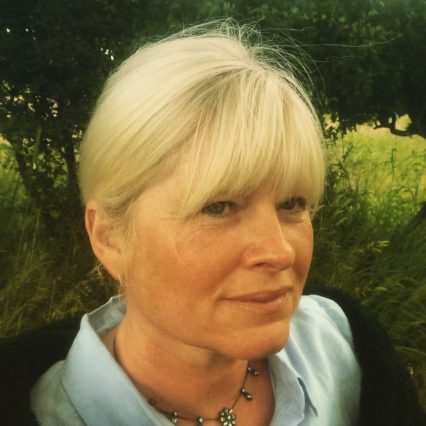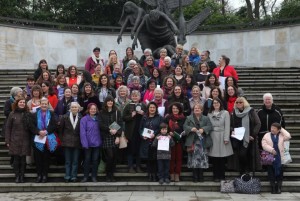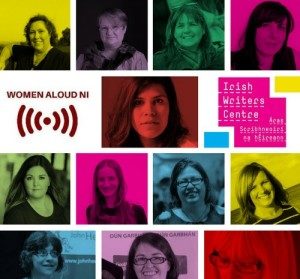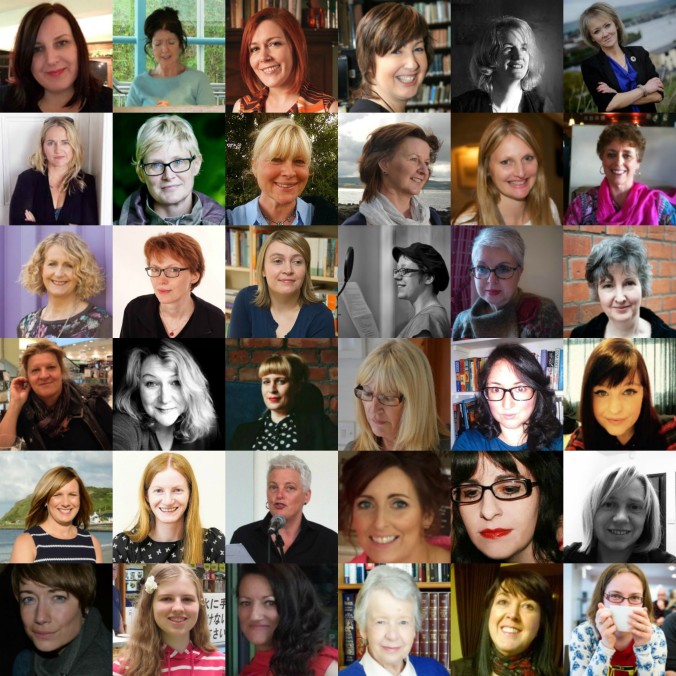Does Northern Ireland have the winning formula for supporting its women writers? Angela Graham considers whether Wales has anything to learn from a dynamic approach.
Women Aloud Northern Ireland (WANI) is a pioneering initiative to improve the promotion and marketing of work by women writers. Although launched less than two years ago, it has been so successful in attracting members and collaborators and in showcasing women writers that there can be little doubt it is answering a significant demand. Is it a role model for women writers in Wales?
WANI is the brainchild of Jane Talbot, an English writer who moved to Northern Ireland in 2011. Blackstaff Press had just brought out her book of short stories, ‘The Faerie Thorn’ and she wanted to connect with the community of fellow local writers. At the time there was controversy about a perceived neglect of women writers from the North in the prestigious new collection of women’s writing ‘The Long Gaze Back: An Anthology of Irish Women Writers’ (New Island Books, 2015). This exacerbated perennial concerns about the low profile of women writers in the North relative to those in the Republic of Ireland.
That lack of prominence within, and also beyond, Ireland is due partly to challenges faced by any small country. It is the larger neighbour whose output claims the bulk of reviews and whose menu of festivals provides platforms a-plenty. Positioning the product is also difficult. In Jane’s view, work from Northern Ireland has been considered, “too Irish for England, Scotland and Wales and not Irish enough for the Irish market.”

She found a core of like-minded women writers and together they changed the game by creating their own platform via facebook and a website: WomenAloudNI. They used International Women’s Day 2016 as an appropriate focus for their first manifestation. 130 women took part in 17 events in all six counties of Northern Ireland. An event was held in Scotland and in Spain.
In a three-day push around the same day in 2017, 250 members powered 12 events in Northern Ireland and there were 6 in Dublin. 50 Northern women travelled to the Irish Writers’ Centre in Dublin where Women Aloud NI members made, in particular, important contributions to the ground-breaking #WomenXBorders events. This year also saw a women’s poetry competition run by Waterstones Coleraine and a recital on the Dublin-Belfast train service.
The programme for Women Aloud 18 on International Women’s Day, 10th March 2018 is shaping up. Many genres are represented in WANI’s membership though poets form about half. Some members write in Irish and Ulster-Scots.
The method is clearly one of seizing the initiative and of thinking beyond the constraints (however benign) of official routes. “You can do what you like,” says Jane, “but you have to be ready to take the knocks that go with being proactive.” She finds the small size of Northern Ireland advantageous in that ideas can take hold quickly. WANI’s remit is flexible. Any member can initiate a project or event.
Literary institutions, both north and south of the border, such as the Arts Council of Northern Ireland, the Irish Writers’ Centre and Literature Ireland, have been very supportive in kind, though not financially, due to the economic climate. WANI is funded by its members and is not currently in receipt of funding from any other source. However, the Arts Council of Northern Ireland and Words Ireland gave generous financial support to the Women X Borders event hosted by the Irish Writers Centre in March 2017: participating writers were given a contribution towards their train fare to Dublin. My impression is that they have welcomed the dynamism of this group.
It might reasonably be asked why such an initiative had not been taken before. Perhaps institutions would have seen it as too ambitious. It takes huge commitment of time to facilitate a communal undertaking of this nature and scale. Just this month a membership fee of £15 a year is being introduced because the purely voluntary method had become unfeasible. The model is probably still evolving.
Key to the group’s success has been its facilitation of face-to-face encounters which Jane believes to be the true building-blocks of the kind of writers’ community she initially sought. Going beyond a ‘virtual’ relationship encourages the collaboration which alone will maintain WomenAloudNI. The essential, she believes, is to have members who are not passive passengers, avoiding engagement and activism. The whole membership has to work for each other, reviewing, spotting opportunities. Members, she says, “should be concerned about how it’s working for all of us.”
She stresses that the group is not a skills-building forum. There are other bodies which do that.
There are, according to Jane, few media opportunities and much ignorance in the media about women writing in Northern Ireland. However, raising the profile of women writers is a first step in a longer process for WANI. The greater aim is reaching readers, near and far. “We need to connect with the readership in new ways and to break out of Northern Ireland where we’re singing loud in a closed bubble.” They would love to tour beyond Northern Ireland but at the moment no funding opportunity exists for that.

Key to their expansion, Jane says, is for writers to be pro-active. “Women have a responsibility to promote their work. It’s common now for publishers to expect the writer to self-promote.” It seems to me that by providing a framework in which women collaborate, WANI is creating volume and momentum. “The ball has to keep rolling,” says Jane. “The publishing environment is getting more challenging and publicity opportunities scarcer. Until women are submitting their work to publishers at the same rate as men, until they’re being published and reviewed (also outside Northern Ireland) and their work bought at the same rate as men then the job isn’t done.”
Jane asserts that WANI is the only initiative of its kind in the UK. Are there lessons here for women writing in Wales? There are some obvious parallels: the scale of the home market and its publishing capacity; the lack of media attention.
But are women writers in Wales slow to self-promote? The great exemplar in Wales in the actual publication of women’s writing is Honno, the women’s press started in Cardiff in 1986 to promote writing for, about and by women in Wales, in both English and Welsh.
Why, I wonder, has there been no WANI-type initiative here?
Helena Earnshaw, Marketing Manager at Honno says, “There are a number of supportive writing networks in Wales – the Honno authors are hugely supportive of each other in a variety of ways and hold regular get-togethers and literary events as well as supporting each other across social media. There is also a Wales network of crime writers – Crime Cymru for Welsh crime writers. When Honno was established over 30 years ago it was essentially to do what WANI are doing now – to raise the profile of women writers in Wales, in fact to get them published in the first place, and provide a space for women’s voices to be heard. Honno could be said to be a forerunner of WANI in a Welsh context.”
The breadth of membership and the group’s size is striking. It remains to be seen whether these will, in the long-term, be strengths or weaknesses.
Helena points out that, “Many Welsh publishers are headed by women – Honno of course, but also including Firefly Press, Cinnamon, Accent, UWP, and the Welsh Books Council itself so women do now have a strong voice in Welsh publishing.”
Northern Ireland has a population of around 1.8 million as compared to just over 3 million in Wales. In both places just over half are women. The bulk of Irish-language publishing takes place in the Republic. Jenni Doherty warns against drawing a facile conclusion from the fact that most publishers in Northern Ireland are headed by men. There are both influential exceptions and many women involved across the publishing range.
Jenni runs Little Acorns Bookstore in Derry, the largest independent bookshop in the north-west of Ireland. She is also an author and has worked in publishing, notably with Guildhall Press. She is enthusiastic about the burgeoning of women’s self-publishing ventures. She cites the magazine SHIFT Lit launched by women. Starting without funding, it is now self-supporting. It provides a platform for new English-language writing, including for under-18s who often struggle to be heard.
Women in publishing is one thing, the promotion of women writers another. “Whether women writers in Wales get a fair share of the publicity and attention is a slightly different issue,” according to Honno’s Helena Earnshaw “and it could be said that there is still work to be done here. The establishment in particular, but also the media to a degree, in Wales traditionally focus on male writers – classics such as Dylan Thomas and Roald Dahl as well as contemporary writers. The XX Festival that ran in Cardiff a few years ago (2014) worked hard to give a space to women writers.
“Outside of Wales a challenge has been issued to publishers by writer Kamila Shamsie to publish only women in 2018, to help reset the perceived gender imbalance in publishing. Something that Honno has been doing every year since 1986! In Wales, maybe as well as publishing women, we need to focus more on reviewing them and giving their work as much recognition as we give to Welsh men.”
If a comparable Gordian knot exists for women writers in Wales perhaps its strands are other than those in Northern Ireland.
Reviewing and recognition… is that where the energy needs to be focused in Wales?
Pleasingly, the debate which contributed to the birth of WANI also resulted in an anthology of women writers from the North of Ireland, The Glass Shore (New Island Books, 2016) which features 25 writers over 3 centuries from what the publisher calls “a previously underappreciated literary canon.” Both anthologies, edited by Sinéad Gleeson, are excellent reads.
Another campaign around the canon of Irish writers – poets, in this instance – has just been launched in Ireland. FIRED! held its first event on 18th November in Belfast. It has emerged as a reaction against an alleged gender imbalance in ‘The Cambridge Companion to Irish Poets’, published earlier this year. The organisers say, “erasing women’s voices from the canon of Irish literature damages the entire canon. It is unacceptable.” Their response is the promotion of a pledge to ask “questions about gender representation early on in collaborative projects… withdrawing our participation when, in our opinion, insufficient effort is made to render representation fair.”
In its short existence WANI has certainly had an impact on the profile of women writers in its locale. What difference it can make to publication and widening readership needs longer to assess.
It prompts this question for women writers here: What initiative would have the most positive effect on your life as a writer and would it be worth getting that underway?












